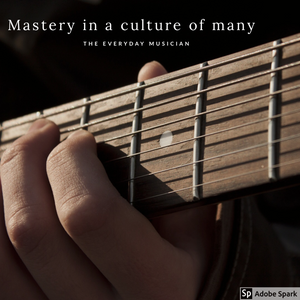What I Wish I Knew Before Graduating From College Part 1
- Feb 28, 2019
- 4 min read
It has been almost 16 years since I first started college and almost a decade since I graduated with a masters. Over the years there have been lots of gigs and a number of teaching opportunities which have lead to a myriad of experiences. Some of these experiences/life lessons I have shared with students that are either about to start college or have already begun. I do this because I would rather they have the opportunity to be aware before being hit in the face with surprise after surprise.
What I'm about to share is based off my experiences and is no way a complete list and may even differ from the experiences of others. Also, some of these may seem like common knowledge, but I mention them just in case. Take this as one more perspective that can be used to pave the way on your musical journey!
Be Proactive
I've said this many times before. Do not wait for the phone to ring. It doesn't matter that you can perform Giants Steps in 12 keys while applying Messiaen's 5th mode in 21/8 while...you get the point. How you go about doing this can be accomplished through hanging out with other musicians, jam sessions, checking out shows, picking up the phone, sending an email, engaging on social media, etc.
For me I felt a heightened since of pressure because I was about to get married after graduating and I knew Sallie Mae and Fed Loan would be coming to collect. My approach was to pick up the phone book and call as many venues as possible, no matter if they had music or not (At one point it was 3-5 places a day). I encountered quite a number of rejections but I did have some success. Many of my first opportunities were solo gigs and then I extended them to trio and quartet. After I established some regular gigs and began playing on a regular basis, then I would call those musicians I wanted to perform with.
Work on making the phone ring, not on waiting for others to reach out to you.
Be Persistent
I am a very persistent person! I don't want to be a pest or annoying, but I will make sure to follow up on possible opportunities. One of the biggest mistakes is to reach out to a venue and expect after one call or email that you have set yourself up for a definite gig. How many other people do you think are also reaching out to the venue? Besides music, how many other things do you think the manager is dealing with?This is why it is a must to follow up!
My approach in the past was to allow two weeks to pass. I then reduced that to one week and even less depending on the venue and if I have a relationship with the person in charge. Rarely has anyone been annoyed with my persistence. In fact, most have recognized it and have told me that they would have completely forgotten if I hadn't kept in contact.
No One Cares About Your Degree
Let me preface by saying that if you are an education major then yes, your degree does matter. Performance major it is useful for teaching at the college level. Otherwise, unless you are tooting your own horn, when you show up to the gig no one is really concerned about the prestige music school you did or did not go to. The question is, can you play? Are you professional? Are you easy to work with?
Your choice of college should not be based on the idea that you need a degree from such and such to be great. The choice should be on what your looking for and what is realistic in terms of financial obligation. Don't put yourself further into debt just to have a label. Be aware of what you are seeking and understand that your level of commitment and work ethic is what plays a huge role.
Side note:
Those experiences, opportunities, and people you connect with are important. Those are what will shape your evolution as a musician. However, don't limit the
Focus On A Few And Not The Many
While pursuing a degree you are bombarded with many subjects and topics, especially in undergrad. You will find yourself in classes that are geared towards majors in other fields of study but still expected to take on the same work load. Add to this the requirements within the classes that directly effect your major.
As you dive further into your studies, especially the study of your instrument, you will cover an array of topics that will take years to work out. The catch? You have to show a sense of understanding in order to be graded.
Once you are out of college it is hard to break the academic mindset of working on a topic for a short time before moving on. This is where you begin to really explore your interest, and that in turn shapes your musical voice. You could take any one topic and turn it into a lifelong study!
Multiple Income Streams
Over the years leading up to now I have had the following income streams:
Adjunct professor, church musician, private instructor (multiple locations), consultant, online lesson sells, teaching through skype, teaching in home, youtube, affiliate marketing, co-write music, musicals, album sells, numerous gigs!
I had a general idea that I would be teaching and performing, but I had no idea that it would have panned out like it has so far. Some of those opportunities came from others asking, most were from me being very proactive in the beginning!
The take away, be open to these opportunities!
Next week I will cover 5 more topics including the financial aspect.







Comments